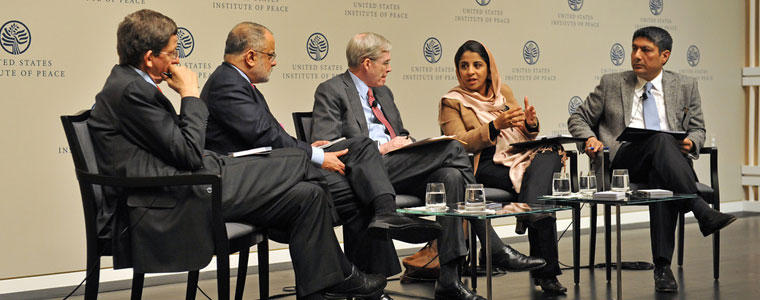Prospects for Peace in Afghanistan
On April 10, USIP hosted a conversation on “Prospects for Peace in Afghanistan,” moderated by former National Security Adviser Stephen Hadley, currently senior adviser for International Affairs at USIP. Key individuals involved in the peace process and independent experts on Afghanistan discussed opportunities and obstacles to peace, what a credible election and an inclusive peace process would look like, and the policy priorities required to increase the prospects for durable peace in Afghanistan.
Read the event coverage, The Afghan Peace Process, Transition and the To-Do List for The U.S.

As news headlines from Afghanistan go from bad to worse, pessimism mounts about the war effort and prospects for peace. This, in turn, fuels demands by some to speed up the security transition to the Afghan National Security Forces and to withdraw most international forces. Questions of troop numbers and withdrawal timeframes dominate international media coverage and policy debates, which will increase in the lead-up to the NATO Summit in Chicago in May when the 2014 security transition in Afghanistan is the top agenda item.
Too often overlooked is the critically important political transition that must also take place in Afghanistan in 2014. Key components of Afghanistan’s political transition are a credible presidential election in 2014 that transfers power from President Karzai to an elected successor as required by the constitution, and a peace process that includes all major elements of Afghan society, including the Taliban. While many Afghans and international observers are deeply skeptical and concerned about the prospect of negotiating with the Taliban, many others fear that a “rush to the exits” by international forces in the absence of a credible election and an inclusive peace process could plunge the country back into factional fighting and civil war.
On April 10 USIP hosted a conversation on “Prospects for Peace in Afghanistan” moderated by former National Security Adviser Stephen Hadley, currently senior adviser for International Affairs at USIP. Key individuals involved in the peace process and independent experts on Afghanistan discussed opportunities and obstacles to peace, what a credible election and an inclusive peace process would look like, and the policy priorities required to increase the prospects for durable peace in Afghanistan.
This event featured the following speakers:
- Ambassador Marc Grossman panelist
Special Representative for Afghanistan and Pakistan
U.S. Department of State - Stephen J. Hadley, moderator
Senior Adviser for International Affairs
U.S. Institute of Peace - Ahmed Rashid, panelist
Author, "Pakistan on the Brink: The Future of America, Pakistan, and Afghanistan"; and
Bestselling Author & Leading Journalist on Pakistan - Nilofar Sakhi, panelist
Founder and Chairperson, Women's Activities and Social Services Association (WASSA); and
Peacebuilding Analyst on Afghanistan Affairs - Ambassador Omar Samad, panelist
Afghanistan Senior Expert in Residence
U.S. Institute of Peace
Explore Further
- Watch video of this event
- Read about the event discussion
- Learn more about USIP's work in Afghanistan
- Read analysis from USIP's work on the Afghan Peace Process
- Read the Peace Works, "Beyond Power-sharing: Institutional Options for an Afghan Peace Process," by Hamish Nixon and Caroline Hartzell
- Read the Special Report, "Thwarting Afghanistan's Insurgency: a Pragmatic Approach to Peace and Reconciliation," by Mohammad Masoom Stanekzai
Related Academy Courses
- Governance and Democratic Practices in War-to-Peace Transitions
- Supporting Police Reform: Capacity Building for Advisers and Trainers
- Rule of Law Practitioners Course



